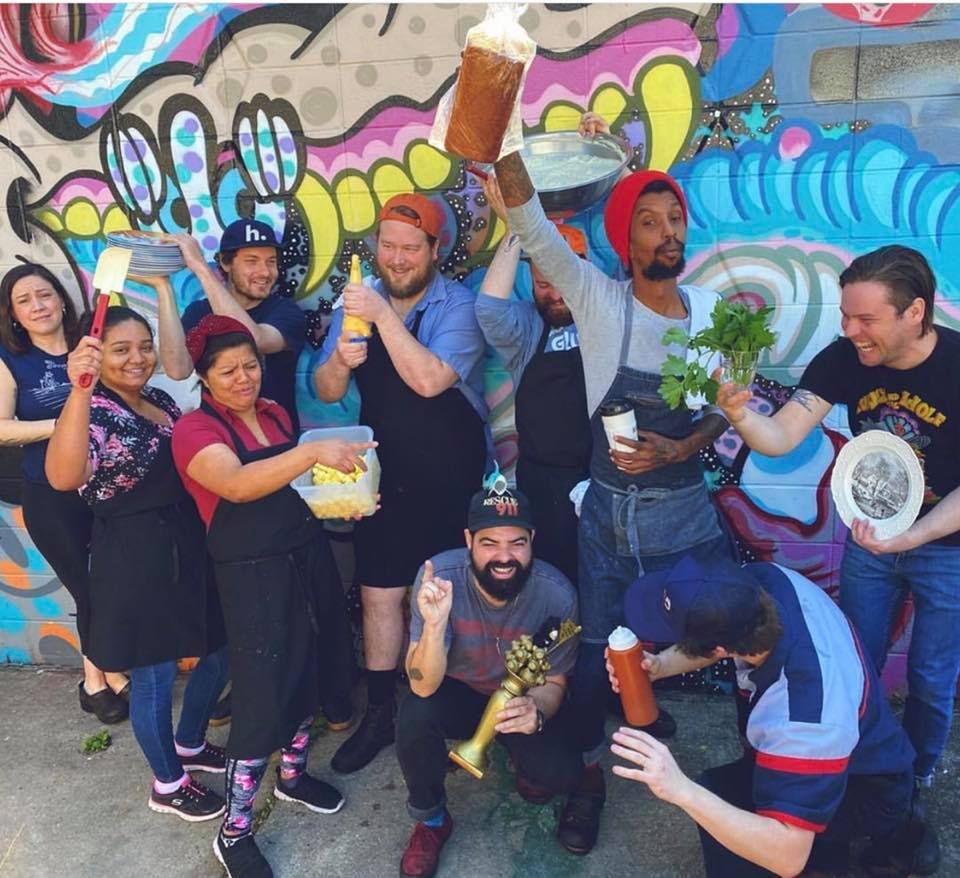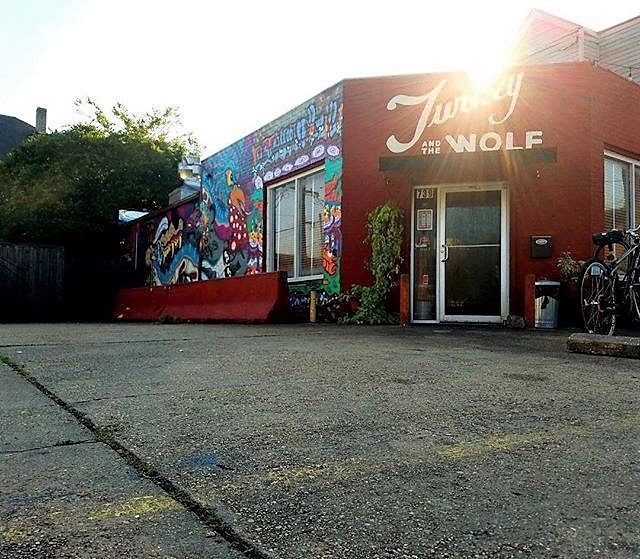In mid-March, the owner
of Turkey and the Wolf and Molly's Rise and Shine, Mason Hereford, and his team
decided to switch both restaurants to take-away only. This decision came from
them independently, the day before the city order came down. Days later, they
decided to close down entirely.
As it became clear that COVID-19 had reached New
Orleans, Hereford and his staff of approximately 24 employees came together to
discuss how they could balance the responsibility of taking care of their staff
with that of protecting the community.
Michael
"Swade" Swadener, the executive sous chef, remembers their early
conversations as "very open and democratic." Even before the outbreak, Hereford
often asked his staff for their ideas of solutions to problems facing the
restaurant, and many decisions were made by majority rule. In
this case, the group quickly decided to switch to take-away orders because they
felt it was safer for everyone involved.
"This is an
unprecedented situation. We did the best we could with the information we had.It was the right move at that time,
and I think when we decided to close a week later, that was also the right
move.Neither of these decisions were
easy. We had many factors to consider, including the health of the staff, the
customers, and the business," Swadener said.
Hereford was
amazed by the staff's desire to look out for each other. Some staff members who
had more in their savings accounts, or who had someone in
their family who was willing to support them, offered to split up their
paychecks to be redistributed among the people in the team who were in less
stable situations.
"We immediately decided that every single person on
our team was going to make the exact same amount of money--whether you're a part-time
cashier, or if you are the executive chef, or whatever. We decided that all the
tips would be split--from the front to the back of the house--evenly. We decided
everyone would make $10 an hour, with all the tips divided evenly, depending on
how much you worked that week."
Three days later, through texts, emails, and one-on-one
conversations, Hereford found out that more of the staff wanted the restaurants
to close than to stay open. The main reason for initially wanting to do
take-out as long as possible was that everyone wanted to look out for everyone
else on the team financially, but when pressed individually, rather than in a
group setting, many on the staff said that they felt uneasy about potentially contributing
to the spread of the disease by staying open.
Another
staff member, Nathan Barfield, remembers feeling conflicted about what he
thought was the right thing to do.
"We were all
told that if we did not feel comfortable coming to work, then we were free to
stay home. I live with my mother-in-law, who is among the demographic of the
most vulnerable to the virus. Because of this, I had already taken leave,
before the final decision was made. I was on the fence because as someone who
had already made the decision not to work, I didn't want to tell someone else
who was healthy that they should not have the opportunity to work and make
money," Barfield said.
Looking back
now, he feels comfortable with their decision to close, because it would have
been stressful for the staff to continue interacting with the public without
knowing for sure who was or wasn't sick, and it was the only way to guarantee
that they weren't contributing to the spread.
Hereford respects the decision of other restaurants
that have chosen to stay open during this time. "We're happy that they're doing
that, and we love that we're able to support them--our team just wanted to tap
out," he said.
Swadener is impressed by the creativity of the restaurants that have remained open, seeing how many are adjusting their menus and service daily.

"I'm glad that the city has
classified restaurants as essential businesses and is allowing them to continue
operating with service modifications. It gives restaurants and their workers an
opportunity to continue to make money and to help get through this tough situation."
Hereford and his staff expressed
anxieties and concern about not knowing how many restaurants will be able to
survive the shutdown and who will still have jobs once it's over. New Orleans
has more restaurants per capita than most cities, and so many people rely on
them for their livelihood. Spring in New Orleans is the busiest season for
restaurants, with more visitors in town for Jazz Fest and the temperate
weather, and that period usually provides a cushion for the long, hot, slow
summers.
At the same time, they have been
inspired by the way the service industry has responded to the crisis. Before
restaurants had even begun to figure out how they would save themselves, they
were already looking for ways to help, like preparing meals for people in need
and donating school lunches.
"The number of people who have said, 'let me know how we can
help' is extraordinary," Hereford said. Purveyors have been reaching out to
restaurants to donate food to support restaurant workers, and the Lee Initiative
has turned Cochon into a relief center for restaurant workers, packing to-go
meals and collecting household supplies.
Ultimately,
Hereford said, "I think if you aren't worried, you aren't paying attention. But
I don't think I've ever been more inspired by the group of people that I work
with. Optimism is important. New Orleans is resilient. We love each other, and
we're going to get through this."
Since closing, Hereford and his team have taken to the
internet to raise money and have been able to raise more money online for the
staff than they would have been able to continue to pay their staff (while
still having enough to reopen at the end of the shutdown).
They had a merch order that they hadn't gotten around
to putting online before the shutdown and decided to put it up for $5 more than
they normally would have sold it for, with all proceeds going to the staff.
With the help of friend Via Fortier, they added a button to their website so
that visitors can "tip the staff" and timed the button with the release of the
new merchandise and the option to purchase gift cards.
Since then, they have been getting everything mailed
out and getting another campaign going. On social media, they shared ways that
customers can help the staff of Molly's Rise and Shine and Turkey and the Wolf
specifically, and how to can help the restaurant industry in general.
They have used their Instagram platform to highlight
the work of Ashtin Berry, who founded the movement Unite America's Table.
Unite America's Table aims to draw attention to the
rights of service industry workers and advocate for change at the federal, state,
and local level. Much of the proposed relief effort so far has been focused on
bailing out small business owners, without enough focus on support for workers.
Helping small businesses through this crisis is crucial, but giving a lump sum
of money to business owners will not necessarily translate directly into help
for workers.
As restaurants adjust to the shutdown, service workers
have been laid off, have had their hours cut, and have been working for to-go
tips and making a fraction of what they normally earn. But even before the
pandemic, service industry workers were already vulnerable because minimum wage
for tipped employees is set at $2.13 an hour in Louisiana, and most service
industry workers don't get sick leave or health insurance.COVID-19 has not only created problems for
workers, but also made more obvious the problems that already existed before
the pandemic.
Unite America's Table has a three-point action plan, starting with making sure that small businesses and service industry workers are included on the Stimulus Bill. On their website is a petition for a proposal based on Rep. Maxine Waters's relief proposal and the Stimulus Bill proposed by Rep. Nancy Pelosi, with suggested amendments that focus on the hospitality industry specifically. Secondly, they are creating a hospitality census to collect data on independent businesses and laborers across the country. Thirdly, they aim to create continuity measures to support people when things like this happen in the future and to make sure that workers who may not have jobs to go back to after the shutdown will have sustained support.

Unite America's Table is a nationwide movement, but
their work is particularly important for a city like New Orleans, where the
restaurant industry is so central to the economy.
Ashtin Berry feels that there should have been more
direct communication from the mayor and city council to local restaurants
during this crisis, and that the city order to switch businesses to take-away
only should have come sooner than it did.
"American cities need to pay more attention to the
hospitality industry, because had restaurants and bars been asked to move to
delivery and take-out or to shorten their hours or implement social distancing
measures immediately, when we heard about the first case, it probably would
have severely lessened the curve. Instead, hospitality workers ended up being
vectors for contraction" Berry said. "Let's just take, for example, the French
Quarter, and how many people those people who work in the service industry come
into contact with a day. Even on a slow day. All you need is one person to be
infected, and they can easily infect multiple people."
"This has proven that not only our mayor, but our City
Council people have a lack of intimacy with our industry, and do not understand
how it operates. And the things that they do understand about it come from a
power position, where they are only communicating with those who have access to
power and money, and that means chefs and owners," Berry continued. "This is
the first pandemic that our country has had for the people who are living right
now. So, I'm not saying that Mayor Cantrell has done a horrible job. I think
that she's doing the best with the knowledge that she has and the resources
that she has. But I am saying that she has some blind spots in how our city
operates. Nationwide, there is a lack of understanding of the hospitality
industry at every level: federal, state, and local government. At the same
time, hospitality workers are the fifth-largest working labor cohort in this
country."
Berry expressed that if the city government had
communicated more directly with restaurant owners earlier on and given more
information about safety measures, owners would have been in a better position
to understand what the virus meant for their businesses and might have been
more likely to communicate better with their staff.
"A lot of owners didn't have direct communication with
their staff about what coronavirus meant for their business. Not all owners;
some owners did go out of their way to communicate what was going on, but the
vast majority did not," Berry said.
Berry hopes that the way that this crisis has made the
vulnerability of service industry workers more obvious will force a
conversation about workers' rights into the fore. The nation can use this as an
opportunity to make changes that needed to happen anyway.
"Hospitality workers need to be politically activated.
I'm hoping this will help them to be. The department of labor suspended
affirmative action guidelines for the next three months. They do not have to
consider diversity. That's really serious in a state like Louisiana. I think
people haven't been asked, prior to this, to think of the industry in an inter-sectional way--how it intersects politically with race and socioeconomic
status and health access. They've never been asked, but now, every owner should
be thinking about it," Berry said.

